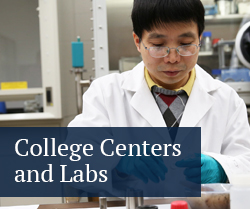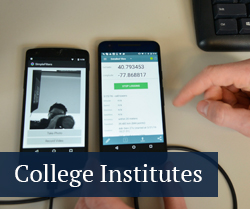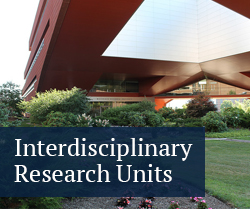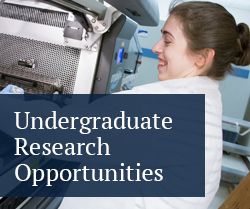College of Engineering Centers and Labs
The College of Engineering operates centers and labs serving a variety of engineering disciplines through research, education, industry collaboration, and outreach. A sample of these research units is listed below.
To find out how to partner with Penn State Engineering on research initiatives, contact us at research@engr.psu.edu.
Aramco High Bay Structural Testing Laboratory
In the Aramco High Bay Structural Testing Laboratory, innovation and engineering excellence come together to advance the future of structural systems. This state-of-the-art facility provides world-class capabilities for testing a wide range of structures—including civil infrastructure, buildings, and aerospace components—at scales ranging from benchtop models to full-size systems. More »
Battery & Energy Storage Technology (BEST) Center
The BEST Center was formed in 2011 to bring together campus-wide expertise in energy storage, foster collaboration, and provide a focal point for research and education activities. The expertise of Penn State researchers within the BEST Center spans from materials to cells to systems. These BEST researchers have made and continue to make significant and pioneering contributions to the most important aspects of energy storage technology.
More »
Center for Acoustics and Vibration
The Center for Acoustics and Vibration's mission is threefold: focus on acoustics and vibration research; foster strong graduate education in those areas; and work with industry to translate research into practice. More »
Center for Biodevices
Established in 2020, the Center for Biodevices aims to bridge foundational science and clinical applications of biodevices, while enabling the success of faculty, clinicians, and students across multiple disciplines. More »
Center for Combustion, Power, and Propulsion
Due to its ability to evolve as the role and impact of combustion in society changes, the combustion research program at Penn State has been and continues to be one of the top combustion programs in the United States. Penn State researchers have made important contributions to the field of combustion, both in terms of improved understanding of combustion fundamentals and the application of combustion science to the development of advanced combustion technology. More »
Center for Computational Biology and Bioinformatics
The Center’s mission is to bring together researchers who are developing and applying computational biology and bioinformatic approaches across a wide range of biological questions. In order to enhance Penn State’s recognized strength in this area, the center will continue to foster collaborations and contribute to education and training. More »
Center for e-Design
The Center for e-Design is a cooperative research center combining industry needs with academic resources to produce more efficient, effective, and collaborative electronic design processes and tools. Many high-tech companies and agencies face engineering challenges that limit the evolution of systems and products. The center is committed to resolving these challenges through creative and innovative research. Center activities focus on fundamental research, research test beds, engineering education, and technology transfer. The Center for e-Design is a National Science Foundation Industry/University Cooperative Research Center. More »
Center for Gas Turbine Research, Education, and Outreach
The goal of the center is to bring together researchers from across the university focused on gas turbine technologies in order to strengthen the collaborations of Penn State faculty and students along with industry and federal agencies interested in gas turbine research, education, and outreach, supporting Penn State’s goal of becoming the “Energy University.” Penn State is one of the only places in the world with research addressing every single part of the gas turbine, as well as the systems they integrate with; this center provides unique educational benefits to our students to differentiate them in their studies and future careers. More »
Center for Health Organization Transformation
The mission of the Center for Health Organization Transformation (CHOT) is to advance transformation in health systems through applied transdisciplinary research. CHOT is a vibrant organization that has been focused on creating healthcare solutions through collaborative research, education, and outreach. More »
Center for Heterogeneous Integration of Micro Electronic Systems
The Center for Heterogeneous Integration of Micro Electronic Systems (CHIMES) brings together fifteen universities to advance monolithic 3D and heterogeneous integration, the efficient and effective integration and packaging of semiconductor devices, chips, and other components. More »
Center for Innovative Materials Processing through Direct Digital Deposition
Penn State, along with its partners, operates the Center for Innovative Materials Processing through Direct Digital Deposition (CIMP-3D) as a world-class resource for advancing and deploying additive manufacturing (AM) technology for critical applications. With a broad mission to advance and deploy AM technology of metallic and advanced material systems to industry, CIMP-3D seeks to advance enabling technologies, provide technical assistance to industry, and promote AM’s potential through training and education. More »
Center for Innovative Sintered Products
A unique partnership among universities, industry, government agencies, and professional and trade associations, the Center for Innovative Sintered Products focuses on the development of cutting-edge technology for the processing of sintered material, particulates, refractory, and hardmaterials. More »
Center for Multiscale Wave-Materials Interactions
With support from Penn State’s College of Engineering, Applied Research Laboratory, Electro-Optics Center, and Materials Research Institute, this center brings together faculty and students interested in interactions occurring when materials are exposed to individual wavelengths and novel combinations of waves. More »
Center for Nanotechnology Education and Utilization
The Center for Nanotechnology Education and Utilization is dedicated to research, development, and education across all aspects of micro- and nanotechnology. The Center resources are focused on addressing the incorporation of nanotechnology into secondary education, into post-secondary education, and into industry applications. More »
Center for Neural Engineering
The Penn State Center for Neural Engineering, an intercollege center bridging the Colleges of Engineering, Medicine, and Science, was created to develop active educational, research, and outreach collaborations with scientists and physicians who are working on developing the next generation of smart devices for the clinical treatment of dynamical diseases of the brain. More »
Center for Research in Design and Innovation
The Center for Research in Design and Innovation provides the resources to facilitate interdisciplinary research in design that is required to understand design-related challenges and create solutions for them. The Center focuses on two research themes: human contexts and design technologies and tools. More »
Center for Service Enterprise Engineering
The Penn State Center for Service Enterprise Engineering (CSEE) is the first U.S. academic center devoted solely to the study and practice of service engineering. CSEE takes an interdisciplinary approach to the study, design, and implementation of service enterprises, emphasizing revenue management, workforce planning, enterprise collaboration, and service quality management. More »
Communications and Space Sciences Laboratory
Communications and Space Sciences Laboratory's educational and research activities center on electromagnetic phenomena either directly or as tools for probing the structure and dynamics of the atmosphere and ionosphere. Truly interdisciplinary, the lab traditionally has provided research opportunities for graduate students not only from electrical and computer engineering, but also from physics, meteorology, mathematics, aeronautics, and engineering science and mechanics. More »
Convergence Center for Living Multifunctional Material Systems Biodevices
The Convergence Center for Living Multifunctional Material Systems (LiMC2) is a research center established in 2020 to advance the science, technologies, policies, and practices needed for a sustainable world through research on engineered living materials. At Penn State, the center reaches out across the university and campuses to establish a network and community of researchers in the emerging area of living multifunctional materials. Together, members will boldly and bravely explore disruptive research to make a significant and positive difference for society at large. More »
Electro-Optics Center
The Electro-Optics Center is a hybrid between the best components of a university and those of private industry, allowing access to the university's researchers and scientists, its state-of-the-art facilities, and leading-edge research. Our staff, comprised primarily of former industry and DoD personnel, brings experience in exceeding sponsor and corporate expectations. Through the application of this hybrid model, the Center is able to provide its sponsors with solutions that combine leading-edge research with on-time and on-budget deliveries. More »
Electrochemical Engine Center
Funded by sponsors from both industrial and government sources, the Electrochemical Engine Center has collaborating faculty and researchers from academia, national laboratories and vehicle manufacturers focused on fundamental and applied research on fuel cells and advanced batteries for electric propulsion, stationary power generation, and portable electronics. More »
High Pressure Combustion Laboratory
Research at the High Pressure Combustion Laboratory has historically been concentrated in the area of combustion of gaseous, solid, liquid, and gelled propellants for rocket and gun propulsion systems, solid fuels for ramjets and hybrid propulsion systems, and metal combustion. Recently, the scope has been expanded further to cover combustion of airbag propellants, flammability/explosion limit determination of gaseous reactants for commercial applications, and study ablation/erosion of rocket nozzle, internal insulation, and heat-shield materials. More »
Hydrogen Energy Center
Hydrogen energy research is one of several important energy-related topics at Penn State. Many faculty, staff, and students at the university are working with collaborators in industry and our National Laboratories on hydrogen storage, production, and utilization. They are inventing new hydrogen technologies and contributing to the growth of a hydrogen infrastructure in Pennsylvania, the United States, and at various locations around the world. More »
Membrane Science, Engineering, and Technology Center
The goal of researchers in the Membrane Science, Engineering, and Technology (MAST) Center is to provide effective solutions to real industrial problems through cutting-edge academic research in the area of membrane science, engineering, and technology. MAST’s fundamental and applied research has led to major advancements in materials and processes in the following areas: energy production, water treatment, pharmaceutical purification, and chemical processing. More »
Microsystems Design Laboratory
With research projects supported by NSF, DARPA, Honda, Toyota (and many more), the Microsystems Design Lab focuses on specific architectural and system-based research fields, ranging from the design of thermal and power-aware circuits and systems, reliable systems, and embedded systems to nanotechnology. More »
Penn State Vertical Lift Research Center
The Penn State Vertical Lift Research Center — also one of three Vertical Lift Research Centers of Excellence in the United States — engages in a wide range of research and education activities related to vertical flight technology, including dynamics, aerodynamics, acoustics, icing, flight control and simulation, and smart structures. More »
Pennsylvania Housing Research Center
The Pennsylvania Housing Research Center serves the home building industry and the residents of Pennsylvania by improving the quality and affordability of housing. The Center conducts applied research, fosters the development and commercialization of innovative technologies, and transfers appropriate technologies to the housing community. More »
START Lab
The Steady Thermo Aero Research Turbine (START) Lab focuses on researching novel methods for improving turbine cooling performance through the testing of realistic turbine hardware to provide engine-relevant data and reduce overall testing costs, providing a test bed for new instrumentation development, and advancing manufacturing methods through the use of additive manufacturing, and investigating novel turbine sealing geometries. More »
Radiation Science and Engineering Center
The Radiation Science and Engineering Center (RSEC) was established to manage Penn State’s comprehensive nuclear research facilities, including the Breazeale Nuclear Reactor, Gamma Irradiation Facility, radioactive sources and radiation measurement resources. The RESC provides safe nuclear analytical and testing facilities in support of the research and education activities of faculty, staff, and students at Penn State while educating the general public about the application of nuclear energy in society. More »





